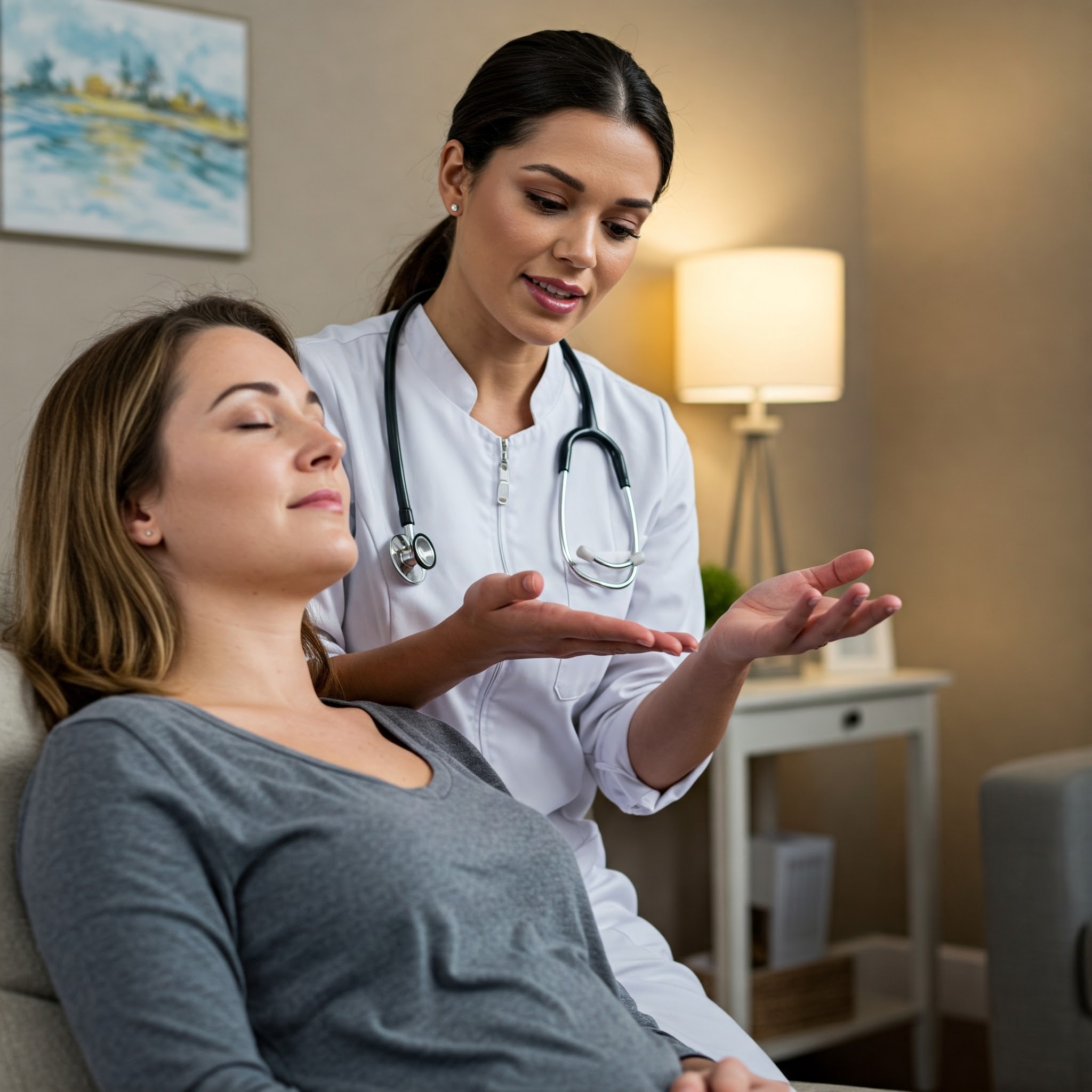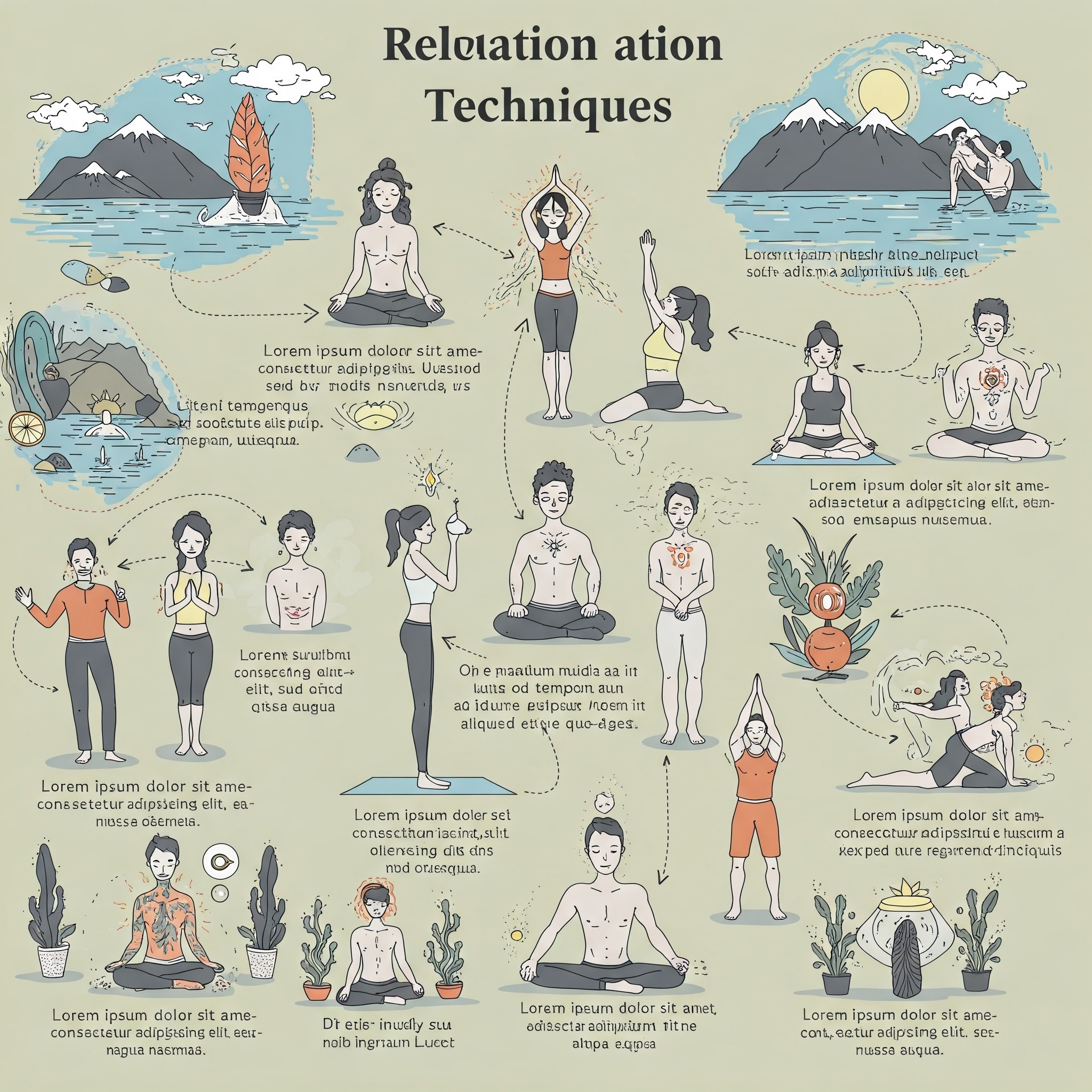Relaxation Techniques
Effective relaxation techniques for stress relief and mental well-being
Proven methods to reduce stress, improve sleep, and foster emotional balance
Neo-Woman Hospital’s Relaxation Techniques Clinic offers a variety of proven relaxation methods designed to reduce stress, improve mental health, and promote overall well-being. Our expert team introduces patients to techniques such as deep breathing exercises, guided meditation, yoga, and rhythmic exercises to help them manage anxiety, sleep disorders, and general stress.
These relaxation techniques are scientifically shown to activate the body’s relaxation response, lowering heart rate, reducing muscle tension, and calming the mind. Whether you’re seeking relief from daily stress or looking for ways to manage anxiety and pain, our clinic offers tailored solutions that fit your needs. We teach individuals how to integrate these practices into their daily lives, ensuring long-term benefits for mental health.
Relaxation techniques not only reduce stress but also help improve sleep quality and emotional balance. At Neo-Woman, we prioritize your mental well-being, offering accessible and effective techniques to promote relaxation and foster a calm, balanced mind.


Neo-woman's relaxation techniques clinic
Stress and anxiety can take a toll on both mental and physical health, and Neo-Woman’s Relaxation Techniques Clinic offers proven methods to promote relaxation and emotional balance. We provide various techniques such as deep breathing exercises, guided meditation, yoga, and rhythmic exercises to help reduce stress, improve sleep, and enhance overall well-being.
Our experienced instructors guide individuals through these practices, teaching them how to integrate relaxation techniques into their daily routines. Whether you’re looking for relief from anxiety, insomnia, or general stress, our clinic offers personalized solutions to help you achieve a calm and balanced mind.
- Deep breathing exercises for relaxation
Deep breathing exercises are a simple yet highly effective relaxation technique that helps to reduce stress and anxiety. By engaging in slow, controlled breaths, individuals activate the parasympathetic nervous system, which promotes relaxation and counteracts the body’s stress response. One popular technique is diaphragmatic breathing, where you breathe deeply into your abdomen rather than shallowly into your chest.
This helps lower heart rate, reduce muscle tension, and clear the mind. Practicing deep breathing can also improve focus and emotional regulation. Regular use of deep breathing exercises for stress management is beneficial, especially during moments of heightened anxiety or stress. By integrating deep breathing into daily routines or whenever stress arises, individuals can gain better control over their emotional responses and improve mental well-being.
Here are some of the check up and health screenings that you should get done:
- Pelvic Exam
- Pap Smear (Cervical Cancer Screening)
- Breast Exam
- Blood Pressure Measurement
- Cholesterol Screening
- Bone Density Scan (DXA)
- Blood Sugar Test (Glucose Screening)
- Thyroid Function Tests
- Blood Count (Complete Blood Count, CBC)
* The specific exams and screenings recommended can vary based on a woman’s age, family history, personal health history, and risk factors. It’s essential to discuss your individual healthcare needs and screening schedule with your healthcare provider.
- Guided meditation for mental clarity and relaxation
Guided meditation is an effective relaxation technique that involves following instructions from a recorded or live guide to help you achieve mental clarity and relaxation. The process usually involves focusing on your breath, body sensations, or a specific image or mantra to redirect your mind away from stressors. This practice encourages mindfulness, which allows individuals to remain in the present moment, reducing rumination and worry.
Guided meditation for stress relief can be particularly helpful for those new to meditation or those who find it difficult to quiet their minds. By practicing regularly, guided meditation helps lower cortisol levels, improve focus, and enhance emotional well-being. It’s an excellent tool to incorporate into one’s daily routine, fostering a greater sense of calm and clarity in a fast-paced world.
- Yoga for stress relief and relaxation
Yoga is a well-known relaxation technique that blends physical movement with mental focus and breath control, making it highly effective for reducing stress and promoting relaxation. The practice includes various poses (asanas) that help release tension in the body, improve flexibility, and promote overall physical health. Yoga also incorporates mindfulness and deep breathing, which help calm the mind and reduce feelings of anxiety or overwhelm.
Poses such as Child’s Pose, Downward Dog, and Savasana are particularly known for their ability to relieve stress and encourage relaxation. By engaging in yoga regularly, individuals can create a sense of balance and harmony between mind and body, allowing them to manage stress more effectively and promote mental and emotional well-being.
- Progressive muscle relaxation for reducing anxiety
Progressive Muscle Relaxation (PMR) is a proven relaxation technique that helps reduce anxiety by systematically tensing and relaxing different muscle groups in the body. The process involves focusing on one muscle group at a time, tightening the muscles for a few seconds, and then releasing the tension, allowing the body to relax.
This helps individuals become more aware of the physical sensations of tension and relaxation, enabling them to better identify areas of stress. By practicing PMR, individuals can reduce physical symptoms of anxiety, such as muscle tightness and increased heart rate. Regular use of PMR not only alleviates anxiety but also improves overall mental clarity and emotional regulation. It’s a practical tool that can be easily incorporated into daily routines to manage stress and improve mental health.
- Using aromatherapy and visualization for deep relaxation
Aromatherapy, when combined with visualization techniques, is a powerful method for achieving deep relaxation. Essential oils such as lavender, chamomile, and sandalwood are known for their calming and soothing properties. When inhaled, these scents can trigger the brain’s relaxation response, lowering heart rate and promoting a sense of calm.
Visualization techniques, on the other hand, involve imagining peaceful and calming scenes, such as a beach or a forest, which helps further reduce stress and anxiety. Together, aromatherapy and visualization can create a multisensory experience that deeply relaxes the body and mind. This combination is particularly useful for individuals who struggle with stress, sleep issues, or chronic pain. By incorporating these techniques into a daily relaxation routine, individuals can enjoy enhanced mental clarity, relaxation, and stress relief.

Frequently asked questions
What are the most common relaxation techniques for stress?
Common relaxation techniques for stress include deep breathing exercises, meditation, yoga, progressive muscle relaxation, and guided visualization. These techniques activate the body’s relaxation response, reducing heart rate and calming the mind, helping to alleviate stress.
How does meditation help with stress relief?
Meditation helps with stress relief by promoting mindfulness, encouraging you to focus on the present moment and reducing ruminative thinking. It also lowers cortisol levels, improves emotional regulation, and promotes a calm, focused state of mind, reducing overall stress.
How often should I practice relaxation techniques?
To experience the full benefits, it’s recommended to practice relaxation techniques daily or whenever you feel stressed. Incorporating practices like meditation or deep breathing into your routine can help reduce the accumulation of stress over time and improve your mental well-being.
Can relaxation techniques help with anxiety?
Yes, relaxation techniques are highly effective for managing anxiety. Techniques like deep breathing, progressive muscle relaxation, and meditation can lower physical symptoms of anxiety, such as a rapid heartbeat or shallow breathing, and help calm the mind.
What is progressive muscle relaxation, and how does it work?
Progressive muscle relaxation involves tensing and then relaxing each muscle group in the body to reduce physical tension. It helps increase awareness of stress in the body and promotes deep relaxation. This technique can be particularly effective for managing stress, anxiety, and sleep issues.

Service line
Our locations
Neo-woman clinic
Apte Road
1212, Apte Rd, opp. Centro Hotel, Shirole Road, Shivajinagar, Pune, Maharashtra 411004
Contact us at: 9423039292
Our locations
Neo-woman clinic
Hadapsar
Gandharva Empire, 3rd floor, Above Fab India, Raskar Chowk, Amanora Park, Hadapsar, Pune, Maharashtra 411036
Contact us at: 7030114488
Copyright © 2026 neo-Woman – all rights reserved.
:::| powered by dimakh consultants |:::